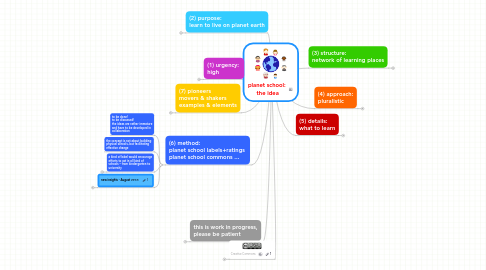
1. (2) purpose: learn to live on planet earth
1.1. resilience
1.2. sustainable lifestyle
1.3. local community
1.4. planetary collaboration
1.5. facilitate change
1.6. personal fulfillment
1.7. ...
2. (1) urgency: high
2.1. THE STATUS The biosphere and the ressources are used over capacity. The world economy is dominated by unsustainable behavior.
2.2. TRANSFORMATION Transformation of lifestyle, structures and systems has to be a global+local, personal+collective effort.
3. (6) method: planet school labels+ratings planet school commons ...
3.1. to be done! to be discussed! the ideas are rather immature and have to be developed in collaboration
3.2. the concept is not about building physical schools, but facilitating effective change
3.3. a kind of label would encourage efforts to act in all kind of schools – from kindergarten to university
3.3.1. the institution can achieve a score and maybe a certification can be established
3.4. new insights - August 2013:
3.4.1. text from post
3.4.2. shift from competitive / gamification elements to more collaborative elements
4. (7) pioneers movers & shakers examples & elements
4.1. The Mycelium School - Education for Regeneration (starting 2012-2013) http://www.myceliumschool.org/
4.2. MicroSociety Bringing Real Life to Learning™ http://www.microsociety.org/
4.3. Cape Town Open Education Declaration: Unlocking the promise of open educational resources
4.4. presente! - the movement http://www.facebook.com/#!/groups/219724974712886/
4.5. Invisible Learning - Toward a new ecology of education http://www.invisiblelearning.com/en/
4.5.1. About the book
4.6. Education Futures Exploring a New Paradigm in human capital development, driven by accelerating change. http://www.educationfutures.com/
4.7. Walk Out Walk On: A Learning Journey into Communities Daring to Live the Future Now | commons learning alliance
4.8. InformalLearning.net Informal learning is learning that occurs in situations that were not specifically designed as learning environments.
4.9. #memorable videos Ken Robinson says schools kill creativity | Video on TED.com
4.10. #memorable videos Sir Ken Robinson: Bring on the learning revolution!
5. this is work in progress, please be patient
5.1. <read the blogpost for more> "The concept of planet schools. Efficient global change." (socialforesight.wordpress.com) http://bitly.com/planetschools
5.2. responsibility for this map contact: Willi Schroll http://willischroll.com schroll at strategiclabs dot de
5.3. The "planet school" idea is not completely new, we see many hotspots of change, initiatives, growing awareness. I especially want to mention Frauke Godat and Andrea Scheer in Berlin for their inspiring work. (http://futureatschool.wordpress.com/)
5.4. what is new? a changelog for your convenience
5.4.1. 2011 0808 WTL>L+L honor the generations living before and after you WTL>W+K philosophy, evolution, history, time, space WTL>VC gift .. - network .. - commons ..
6. Creative Commons
6.1. permalink of this mind map: http://www.mindmeister.com/106237621/planet-school-the-idea temporarily: http://planetschool.net
7. (3) structure: network of learning places
7.1. schools in exchange
7.2. informal learning opportunities
7.3. students in communication and co-creation
7.4. environments for action
8. (4) approach: pluralistic
8.1. new approaches to learn are welcome
8.2. no ideological bias
8.2.1. evidence based? neuro research
8.2.2. always with fun
8.3. connected learning
9. (5) details: what to learn
9.1. live and love
9.1.1. pesonal development
9.1.2. presence, respect, empathy
9.1.2.1. RSA Animate - The Empathic Civilisation? - YouTube
9.1.3. sustainable relations
9.1.4. self management
9.1.5. understanding the whole
9.1.6. honor the generations living before and after you
9.1.7. contemplation
9.2. create and give
9.2.1. find your passion
9.2.2. learn to discover
9.2.3. share with others
9.2.4. be mindful
9.2.5. learn to listen
9.2.6. learn to act
9.2.7. co-creation
9.2.8. the arts, music, dance
9.3. communicate and convince
9.3.1. find your voice
9.3.2. understand all senses
9.3.3. intercultural skills
9.3.4. media skills, audio, video
9.3.5. social media to move things
9.3.6. critical thinking, rhetoric, discourse
9.4. collabarate and work smart
9.4.1. coworking
9.4.2. create + organize spaces
9.4.3. new forms of work
9.4.4. professional collaboration tools
9.4.5. translation services
9.4.6. crowdsourcing
9.5. consume and produce sustainably
9.5.1. share things
9.5.1.1. Mesh - the living network of sharing http://meshing.it/
9.5.2. understand your footprint
9.5.3. saving ressources and energy
9.5.4. sustainable living
9.5.5. diy / prosumer
9.6. organize and lead change
9.6.1. complexity & simplexity
9.6.2. schedules & meetings
9.6.3. project management
9.6.4. events - small and big
9.6.5. team building
9.6.6. networking
9.7. world and knowledge
9.7.1. challenges of 21st century
9.7.2. understand the biosphere
9.7.3. philosophy, evolution, history, time, space
9.7.4. globalisation and your local world
9.7.5. how to access and use the sources of knowledge
9.8. technology and innovation
9.8.1. social technologies
9.8.2. smart green technologies
9.8.3. emerging technologies
9.8.4. social innovation
9.9. use and develop methods
9.9.1. art of hosting
9.9.2. creativity & facilitation
9.9.3. design thinking
9.9.4. moderation techniques
9.9.5. new leadership
9.9.6. service design
9.9.7. theory u
9.10. value creation
9.10.1. the new basicss
9.10.1.1. happiness & economy
9.10.1.2. loops, transparency, resilient structures
9.10.1.3. economical basics
9.10.1.4. network economy, sharing economy
9.10.1.5. crowdsourcing
9.10.1.6. crowdfunding
9.10.1.7. the commons, creative commons
9.10.1.8. gift economy
9.10.2. service creation
9.10.3. metabolism
9.10.3.1. understanding forests + agriculture
9.10.3.2. renewables
9.10.3.3. understanding energy systems
9.10.4. mobility for the 21st century
9.10.5. sustainable buildings
9.10.5.1. green architecture
9.10.5.2. eco-villages
9.10.6. social business
9.10.7. social enterprise
9.10.8. social capital
9.10.9. bottom of pyramid
9.10.10. fundraising
9.10.11. business model innovation
9.11. more building blocks of new thinking
9.11.1. Cradle2Cradle Design biomimetic approach to the design of systems. http://en.wikipedia.org/wiki/Cradle_to_Cradle_Design
9.11.2. The Emergence of Open Design and Open Manufacturing - Michael Bauwens http://www.we-magazine.net/we-volume-02/the-emergence-of-open-design-and-open-manufacturing/
9.11.3. Open social enterprise http://bettermeans.org/
9.11.3.1. video
9.12. your ideas?
9.12.1. contact me on linkedin/facebook Willi Schroll schroll at strategiclabs dot de
